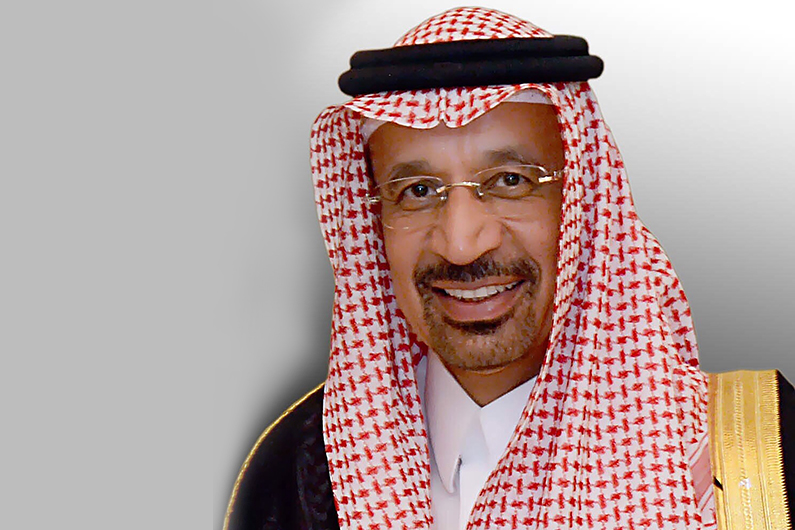
Al-Falih: KAPSARC to address global challenges facing energy
Innovating thinking and setting ambitious targets to bring about a boom in the global energy system was Khalid Al-Falih, minister of energy, industry and mineral resources’ message during this opening speech of the Energy Dialogue 2016 here on Tuesday.
The two-day Energy Dialogue is organized by King Abdullah Petroleum Studies and Research Center KAPSARC to act as a catalyst where solutions and common vision on the many energy challenges the global community face are addressed.
Over 300 researchers and energy specialist and policymakers from around the world attended the first day of the dialogue. The two-day dialogue consists of 3 key speakers and 16 specialized sessions to address the latest challenges in energy transitions and economic transformation.
During his opening remarkets the minister stressed the primary role of KASPARC lies in addressing the global challenges facing the energy sector, and identifying solutions that can be put forward to the global energy community. The role that has been put on the shoulders of KAPSARC aims to create an unprecedented future, stated the minister.
He focused on three points during this speech; the evolution of global energy system and the move from debate to action, multidimensional wave of change that is remaking and reorienting world economics and our way of life and, the Kingdom’s economy and its line with Saudi Vision 2030.
The minister also addressed climate change stressing the need to create a balance between economic development and the needs and necessities of preserving the environment by increasing the economic value of energy.
Al-Falih stressed the importance of the Energy Dialogue 2016, which has brought together a large number of experts, researchers alongside academics and policymakers to participate in a forum and work together to discuss various points of view aimed at helping mankind in facing the most difficult challenges in the field of energy and to assist in ensuring the sustainable provision of energy to the world in the future.
Transition to the new global energy mix will take time, said the minister noting that traditional and non-traditional fuel projects would together be part of the global energy mix in the future, alongside an increased reliance on alternatives energy.
The mnister stated that the Kingdom is committed to meeting the energy needs of China, India and other developing economies during the stages of transformation that will last for decades in order to reach a more environmentally sustainable future.
Taking into account that the same transformation path of transition itself must continue to meet the tests of accessibility, availability, affordability and acceptability.
Renewables can and should play a greater role in meeting world’s energy needs and the Kingdom is keeping an open mind as to the best route to achieve global climate objectives, said the minister.
The Kingdom is investing heavily in renewables and have set aggressive targets for the growth of these sources, such as introducing 9.5 gigawatts of power generation through renewables; particularly solar and wind energy. The minister praised the continues and untiring efforts of King Abdullah City for Atomic and Renewable Energy to develop a mix of energy more sustainable and long-term energy mix for the Kingdom.
Al-Falih addressed the drivers of energy transformation that are rooted in the broader mega trends shaping the world, stressing the link between energy, economic development, societal shifts and ecological sustainability. Stating that groundbreaking technologies will have profound implications on the way energy is produced and consumed.
The Kingdom’s ability to move beyond an economy based on its role as an energy provider therefore depends on staying ahead of the trends and remaining competitive in the global market place, stated the Minister. Mentioning the endowment of oil and gas and the lower cost of energy has powered economic growth and encouraged the growth of energy-intensive industries such as petrochemicals and aluminum.
In reference to Saudi Vision 2030 the minister stated the calls for economic diversification, privatization of major state-owned enterprises, an economy led by private sector, greater localization and international investment to help diversify revenue sources and turn the Kingdom into a global logistical hub connecting Asia, Africa and Europe.
He also mentioned that the Kingdom will fully leverage the next industrial revolution to drive future economic growth and seize new industrial opportunities such as digitization, artificial intelligence, robotic, cloud computing and geonomics, biotechnology and big data. Referring to the Kingdom’s recent Softbank agreement to participate in a $100 billion investment fund as an example of the Kingdom’s determination.
In order to prepare for such a technological intensive future the minister stressed the importance in bridging the gap in high quality education and sharpen the Kingdom’s focus on STEM disciplines, training, research, innovation and entrepreneurship.
Only through emphasis on national capacity building will the Kingdom be able to successfully participate in the knowledge industries of the future, stated Al-Falih.
The minister cautioned that this does not mean reducing the contribution of oil, gas and chemicals or mining, but enhancing the development of other sectors to rebalance and accelerate the overall growth of the economy.
Samer Alashgar, president of KAPSARC, stated the aim of the Enegry Dialogue 2016 is to pave the way for open discussion and high-level interaction between policymakers, researchers and practitioners and civil society on pressing energy issues. Aiming to shape solutions that can be put forward to the global energy community.


























